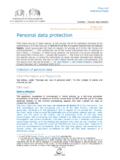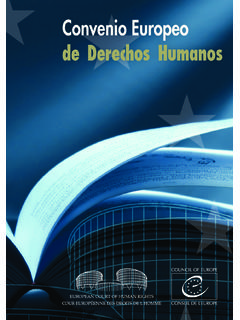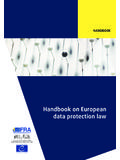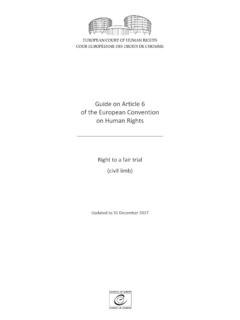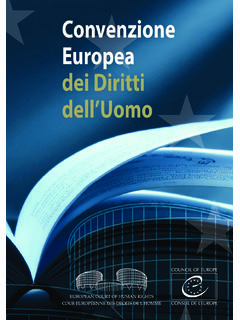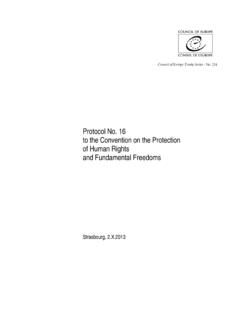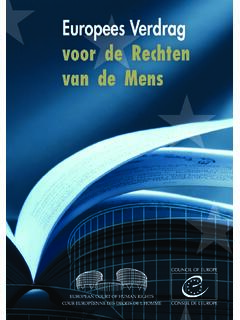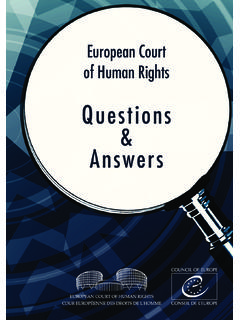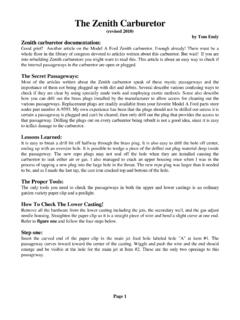Transcription of FS Hate speech ENG - CoE
1 Factsheet hate speech January 2022 This factsheet does not bind the Court and is not exhaustive hate speech Freedom of expression constitutes one of the essential foundations of [a democratic] society, one of the basic conditions for its progress and for the development of every man. Subject to paragraph 2 of Article 10 [of the European Convention on Human Rights], it is applicable not only to information or ideas that are favourably received or regarded as inoffensive or as a matter of indifference, but also to those that offend, shock or disturb the State or any sector of the population.
2 Such are the demands of that pluralism, tolerance and broadmindedness without which there is no democratic society . This means, amongst other things, that every formality , condition , restriction or penalty imposed in this sphere must be proportionate to the legitimate aim pursued. (Handyside v. the United Kingdom judgment of 7 December 1976, 49).. [T]olerance and respect for the equal dignity of all human beings constitute the foundations of a democratic, pluralistic society. That being so, as a matter of principle it may be considered necessary in certain democratic societies to sanction or even prevent all forms of expression which spread, incite, promote or justify hatred based on intolerance.
3 , provided that any formalities , conditions , restrictions or penalties imposed are proportionate to the legitimate aim pursued. (Erbakan v. Turkey judgment of 6 July 2006, 56). 1. When dealing with cases concerning incitement to hatred and freedom of expression, the European Court of Human Rights uses two approaches which are provided for by the European Convention on Human Rights: - the approach of exclusion from the protection of the Convention, provided for by Article 17 (prohibition of abuse of rights)1, where the comments in question amount to hate speech and negate the fundamental values of the Convention.
4 And - the approach of setting restrictions on protection, provided for by Article 10, paragraph 2, of the Convention2 (this approach is adopted where the speech in question, although it is hate speech , is not apt to destroy the fundamental values of the Convention). 2. Internet news portals which, for commercial and professional purposes, provide a platform for user-generated comments assume the duties and responsibilities associated with freedom of expression in accordance with Article 10 2 of the Convention where users disseminate hate speech or comments amounting to direct incitement to violence.
5 1 This provision is aimed at preventing persons from inferring from the Convention any right to engage in activities or perform acts aimed at the destruction of any of the rights and freedoms set forth in the Convention. 2 Restrictions deemed necessary in the interests of national security, public safety, the prevention of disorder or crime, the protection of health or morals and the protection of the rights and freedoms of others. Factsheet hate speech 2 Exclusion from the protection of the Convention [T]here is no doubt that any remark directed against the Convention s underlying values would be removed from the protection of Article 10 [freedom of expression] by Article 17 [prohibition of abuse of rights] (.)
6 (Seurot v. France, decision on the admissibility of 18 May 2004). Threat to the democratic order As a rule, the Court will declare inadmissible, on grounds of incompatibility with the values of the Convention, applications which are inspired by totalitarian doctrine or which express ideas that represent a threat to the democratic order and are liable to lead to the restoration of a totalitarian regime. See, among others: Communist Party of Germany v. the Federal Republic of Germany, decision of the European Commission on Human Rights3 of 20 July 1957; , , and v.
7 Austria (no. 12774/87), decision of the Commission of 12 October 1989; Nachtmann v. Austri a, decision of the Commission of 9 September 1998; Schimanek v. Austria, decision of the Court on the admissibility of 1 February 2000. Racial hate Glimmerveen and Haqenbeek v. the Netherlands 11 October 1979 (decision of the European Commission of Human Rights4) In this case, the applicants had been convicted for possessing leaflets addressed to White Dutch people , which tended to make sure notably that everyone who was not white left the Netherlands. The Commission declared the application inadmissible, finding that Article 17 (prohibition of abuse of rights) of the Convention did not permit the use of Article 10 (freedom of expression) to spread ideas which are r acially discriminatory.
8 Negationism and revisionism Garaudy v. France 24 June 2003 (decision on the admissibility) The applicant, the author of a book entitled The Founding Myths of Modern Israel, was convicted of the offences of disputing the existence of crimes against humanity, defamation in public of a group of persons in this case, the Jewish community and incitement to racial hatred. He argued that his right to freedom of expression had been infringed. The Court declared the application inadmissible (incompatible ratione materiae). It considered that the content of the applicant s remarks had amounted to Holocaust denial, and pointed out that denying crimes against humanity was one of the most serious forms of racial defamation of Jews and of incitement to hatred of them.
9 Disputing the existence of clearly established historical events did not constitute scientific or historical research; the real purpose was to rehabilitate the National Socialist regime and accuse the victims themselves of falsifying history. As such acts were manifestly incompatible with the fundamental values which the Convention sought to promote, the Court applied Article 17 (prohibition of abuse of rights) and held that the applicant was not entitled to rely on Article 10 (freedom of expression) of the Convention. 3. Together with the European Court of Human Rights and the Committee of Ministers of the Council of Europe, the European Commission of Human Rights, which sat in Strasbourg from July 1954 to October 1999, supervised Contracting States compliance with their obligations under the European Convention on Human Rights.
10 The Commission ceased to exist when the Court became permanent on 1st November 1998. 4. See footnote 3 above. Factsheet hate speech 3 See also, among others: Honsik v. Austria, decision of the European Commission of Human Rights5 of 18 October 1995 (concerning a publication denying the committing of genocide in the gas chambers of the concentration camps under National Socialism); Marais v. France, decision of the Commission of 24 June 1996 (concerning an article in a periodical aimed at demonstrating the scientific implausibility of the alleged gassings ).

